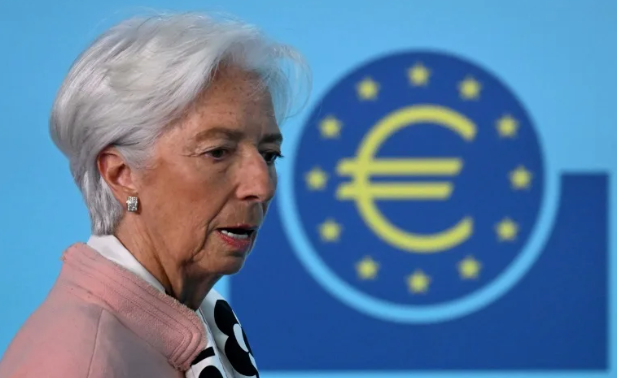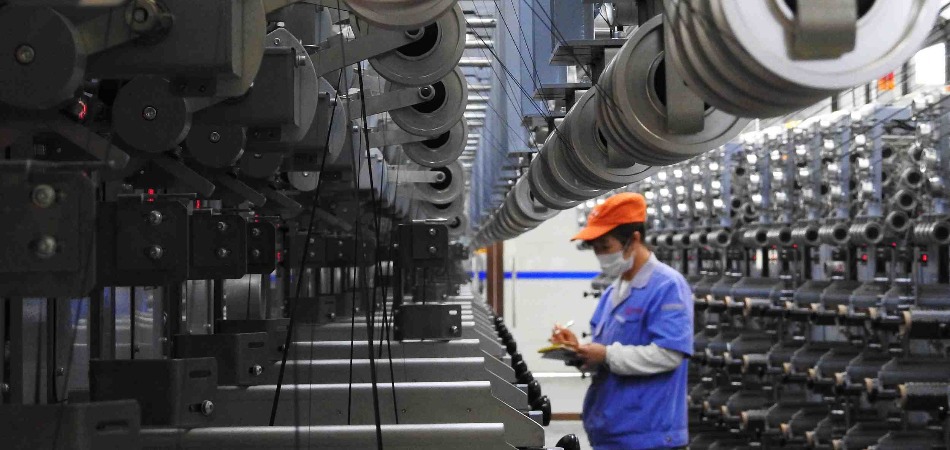ECB cuts interest rates for seventh time amid trade tensions

By MG News | April 18, 2025 at 12:14 PM GMT+05:00
April 18, 2025 (MLN): The European Central Bank lowered interest rates for the seventh time since last June as trade tensions threaten to derail the region’s economic recovery.
The deposit rate was decreased by a quarter-point to 2.25%, as predicted by almost all analysts polled by Bloomberg.
The ECB dropped the word “restrictive” from its statement in relation to the monetary-policy stance, as Bloomberg reported.
But markets boosted bets on further cuts in borrowing costs as officials underscored the headwinds that Europe currently faces.
“Downside risks to economic growth have increased,” President Christine Lagarde told reporters Thursday in Frankfurt, stressing that it will still take time for the full consequences of US tariffs to become clear.
“The major escalation in global trade tensions and associated uncertainties will likely lower euro-area growth by dampening exports, and it may drag down investment and consumption,” she said.
“Deteriorating financial-market sentiment could lead to tighter financing conditions.”
German bonds erased losses, with the 10-year yield slightly down on the day to 2.5%.
The euro extended an earlier decline, falling as much as 0.6% to $1.336. Markets now foresee three more reductions in the deposit rate before the year is out.
"The forward-looking view on the economy implies an expected shock from tariffs," said Mark Wall, chief European economist at Deutsche Bank.
The characterization of ‘exceptional’ uncertainty suggests an openness to further monetary easing, assuming the trade shock persists and is borne out in the data.
“We continue to expect another rate cut in June and a terminal rate of 1.5% by year-end.”
Having just weeks ago been pondering a pause in its easing campaign, this month’s announcement by President Donald Trump of sweeping tariffs on the US’s trading partners tilted support within the ECB back toward a further reduction.
The prospect of another move became more attractive to policymakers as inflation continued to retreat toward the ECB’s 2% goal, and was bolstered by falling energy costs and a plunge in confidence indicators.
A surprise gain in the euro, meanwhile, has elevated the common currency to a three-year high against the dollar.
“Investor sentiment has proven more resilient toward the euro area than toward other economies,” Lagarde said, reiterating that the ECB doesn’t target a particular exchange rate.
The ECB’s new language indicates that officials now consider policy to be within the range of estimates for neutral a level that neither stimulates nor restricts economic activity.
Lagarde said that the concept of a neutral rate is no longer useful, going as far as to call it “meaningless” given the current state of uncertainty.
With inflation already on the back foot, the fear now is that US levies will extinguish hopes for a revival in the euro zone’s 20-nation economy potentially dragging consumer-price growth below the target.
Despite some backtracking by Trump, European Union products face 10% tariffs for 90 days, with no firm indication on what happens beyond that.
His standoff with China, meanwhile, has spiraled raising the risk that some of its goods are diverted to Europe at discounted prices.
The Federal Reserve finds itself in a trickier bind and may be forced to stand pat until there’s greater clarity.
Chair Jerome Powell warned on Wednesday that a weakening economy and elevated inflation could bring its dual goals of price stability and maximum employment into conflict.
In contrast, March data from the euro area confirmed frequent statements by ECB officials that disinflation is on track.
Prices rose by just 2.2% from a year ago, while the closely watched services component eased to 3.5% from 3.7% as wage pressures abated.
“Increasing global trade disruptions are adding more uncertainty,” Lagarde said. “Falling global energy prices and the appreciation of the euro could put further downward pressure on inflation.
This could be reinforced by lower demand for euro-area exports owing to higher tariffs and a rerouting of exports into the euro area from countries with overcapacity.”
Economists polled by Bloomberg before Thursday’s decision predict another cut in borrowing costs at the ECB’s next policy meeting, in June, after which they’ll be held at 2% at least through the end of next year.
The volatile backdrop, however, has left Goldman Sachs, Deutsche Bank and Bank of America forecasting deeper reductions.
Copyright Mettis Link News
Related News
| Name | Price/Vol | %Chg/NChg |
|---|---|---|
| KSE100 | 130,686.66 280.01M |
0.26% 342.63 |
| ALLSHR | 81,305.25 897.01M |
0.35% 281.26 |
| KSE30 | 39,945.45 114.02M |
0.09% 37.19 |
| KMI30 | 190,698.05 148.61M |
0.61% 1163.05 |
| KMIALLSHR | 55,074.15 495.43M |
0.53% 290.50 |
| BKTi | 34,568.40 28.73M |
-1.07% -372.33 |
| OGTi | 28,739.35 22.59M |
1.57% 443.29 |
| Symbol | Bid/Ask | High/Low |
|---|
| Name | Last | High/Low | Chg/%Chg |
|---|---|---|---|
| BITCOIN FUTURES | 110,300.00 | 110,525.00 110,105.00 |
-115.00 -0.10% |
| BRENT CRUDE | 68.76 | 68.89 68.73 |
-0.04 -0.06% |
| RICHARDS BAY COAL MONTHLY | 97.50 | 0.00 0.00 |
-0.75 -0.76% |
| ROTTERDAM COAL MONTHLY | 108.45 | 109.80 108.45 |
-0.55 -0.50% |
| USD RBD PALM OLEIN | 998.50 | 998.50 998.50 |
0.00 0.00% |
| CRUDE OIL - WTI | 67.03 | 67.18 66.99 |
0.03 0.04% |
| SUGAR #11 WORLD | 16.37 | 16.40 15.44 |
0.79 5.07% |
Chart of the Day
Latest News
Top 5 things to watch in this week
Pakistan Stock Movers
| Name | Last | Chg/%Chg |
|---|
| Name | Last | Chg/%Chg |
|---|



.jpg)
 Trade Balance
Trade Balance
 CPI
CPI